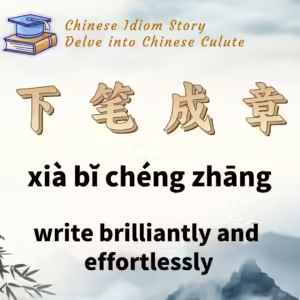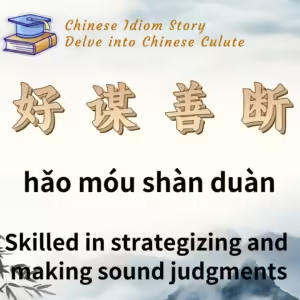
Chinese Idiom: 下笔成章 (Xia Bi Cheng Zhang)
English Translation: To write brilliantly and effortlessly
pīn yīn: xià bǐ chéng zhāng
Idiom Meaning: Refers to someone who can write well and quickly, with a natural ability to produce elegant and coherent prose or poetry. It highlights the ease and fluency in writing.
Historical Source: Sanguozhi (《三国志·魏书 · 陈思王植传》)
Idiom Story:
Cao Cao, a prominent statesman and military leader in Chinese history, was also known for his insightful and strict approach to raising his children. Among his five sons, each had distinct attributes and achievements. Cao Pi, the second son, was skilled in governance and literature; Cao Zhang excelled in military affairs; and Cao Zhi (曹植), the fourth son, made significant contributions to literature.
Cao Zhi, also known as Cao Zhi, was renowned for his literary talent, particularly in poetry. His poems were known for their five-character lines and sophisticated use of metaphor, significantly impacting the development of Chinese poetry.
Despite the turbulent times, Cao Cao encouraged his son to study diligently. In 214 AD, as Cao Cao prepared for a military campaign against Sun Quan, he specifically called Cao Zhi to offer advice. He remarked that at the age of twenty-three, he had already held a governmental position and encouraged Cao Zhi to work even harder.
Under Cao Cao’s direct influence and high expectations, Cao Zhi dedicated himself to writing, often neglecting luxurious trappings and focusing on his literary pursuits. Over his lifetime, Cao Zhi produced more than two hundred poems and essays, including masterpieces like “Luoshen Fu” (《洛神赋》) and “Zeng Bai Ma Wang Biao” (《赠白马王彪》).
Cao Zhi’s writing was so fluent and brilliant that even his father was sometimes astonished. On one occasion, after reading one of Cao Zhi’s compositions, Cao Cao questioned whether it was really Cao Zhi’s own work. Cao Zhi responded by saying, “言出为论,下笔成章” (“When I speak, it’s argument; when I write, it’s an article”). This phrase reflected his natural ease and skill in writing.
This story gave rise to the idiom “下笔成章”, which is used to describe someone who can write with great ease and effectiveness, creating accomplished and polished works effortlessly.






